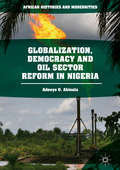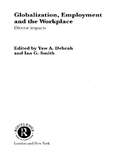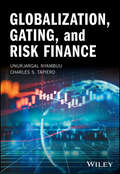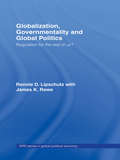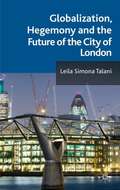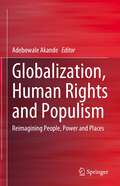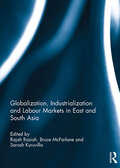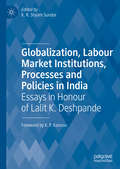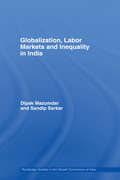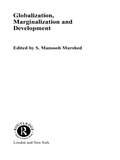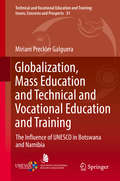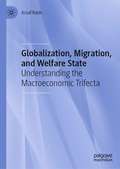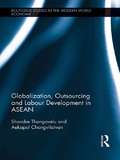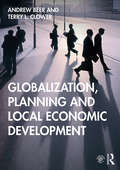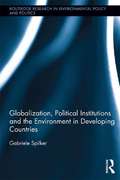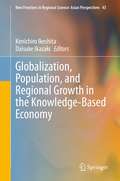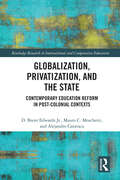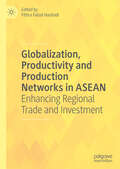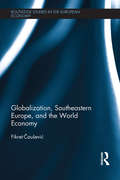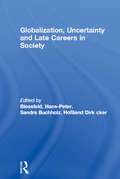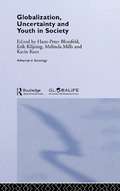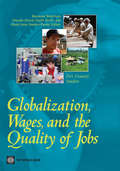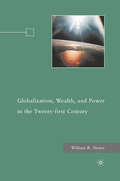- Table View
- List View
Globalization, Democracy and Oil Sector Reform in Nigeria
by Adeoye O. AkinolaThe Nigerian state has been oil-rich for decades, and yet perennially incapable of converting its oil resources into wealth for ordinary Nigerians. Adeoye O. Akinola tackles this "vexed" oil question by examining the political economy of efforts to deregulate the Nigerian downstream oil industry. Focusing on themes of globalization and democratization, this book considers how a resource-rich developing country like Nigeria can exploit the opportunities of globalization and navigate the pressures of democratization and the challenges of liberalization. Pairing sophisticated theoretical frameworks with firsthand accounts from actors in the oil industry, this book identifies the root causes of Nigeria's development struggles and offers practical policy solutions for successfully deregulating the oil sector. For public officials and policymakers as well as researchers, this book offers a critical new lens on the future of natural resource management in Nigeria and the Global South.
Globalization, Employment and the Workplace: Diverse Impacts (Routledge Studies in International Business and the World Economy #Vol. 28)
by Yaw A. Debrah Ian G. SmithThe globalization of business is a relatively new process. Although its influence on work, employment, the labour process and the management process has become increasingly significant, little is known about these developments. In order to redress this imbalance, this book provides evidence of the nature and degree of significance that globalization holds for nation states, cultures, trade unions, employees and business management. Underlying the various contributions is a focus upon the varied and complex nature of internationalism in the business world.
Globalization, Gating, and Risk Finance
by Charles S. Tapiero Unurjargal NyambuuAn in-depth guide to global and risk finance based on financial models and data-based issues that confront global financial managers. Globalization, Gating, and Risk Finance offers perspectives on global risk finance in a world with economies in transition. Developed from lectures and research projects investigating the consequences of globalization and strategic approaches to fundamental economics and finance, it provides an approach based on financial models and data; it includes many case-study problems. The book departs from the traditional macroeconomic and financial approaches to global and strategic risk finance, where economic power and geopolitical issues are intermingled to create complex and forward-looking financial systems. Chapter coverage includes: Globalization: Economies in Collision; Data, Measurements, and Global Finance; Global Finance: Utility, Financial Consumption, and Asset Pricing; Macroeconomics, Foreign Exchange, and Global Finance; Foreign Exchange Models and Prices; Asia: Financial Environment and Risks; Financial Currency Pricing, Swaps, Derivatives, and Complete Markets; Credit Risk and International Debt; Globalization and Trade: A Changing World; and Compliance and Financial Regulation. Provides a framework for global financial and inclusive models, some of which are not commonly covered in other books. Considers risk management, utility, and utility-based multi-agent financial theories. Presents a theoretical framework to assist with a variety of problems ranging from derivatives and FX pricing to bond default to trade and strategic regulation. Provides detailed explanations and mathematical proofs to aid the readers’ understanding. Globalization, Gating, and Risk Finance is appropriate as a text for graduate students of global finance, general finance, financial engineering, and international economics, and for practitioners.
Globalization, Governmentality and Global Politics: Regulation for the Rest of Us? (RIPE Series in Global Political Economy)
by Ronnie Lipschutz James K. RoweGlobalization is moving fast, impacting on the life of all nations with accelerating force. In this new study Ronnie Lipschutz shows how it is being handled by specific groups seeking positive outcomes for the people and causes they represent. Globalization, Governmentality and Global Politics details how the widespread failure of states and corporations to regulate the impact of increased globalization has given rise to non-governmental organizations and movements, aiming to influence corporations regarding social responsibilities and address key issues such as human rights, environmental destruction, unhealthy working conditions and child labour. Assessing the effectiveness of these efforts, it examines both the new movements and the issues they are tackling. With three key case studies on the clothing industry, sustainable forestry and corporate social responsibility, it explores the tensions between politics and management, examining the theoretical implications of regulation for politics, citizenship and the state. Finally, it takes a fresh look at what is to be done, calling for a return to politics centred on the direct participation of the individual in the social choices that affect quality of life, working conditions and the global future.
Globalization, Hegemony and the Future of the City of London
by Leila Simona TalaniThis book gives a detailed account of the primacy of the City of London, both as a domestic actor and as a global financial centre. It focuses on whether the hegemonic position of the City of London can be threatened by the globalization process and how this relates to its role as an international money laundering centre.
Globalization, Human Rights and Populism: Reimagining People, Power and Places
by Adebowale AkandeThis book offers a comprehensive and multidisciplinary global overview of populism and human rights in the light of globalization. It examines why the dominant (neo)liberal paradigm of the last decades resulted in major economic and social inequalities which resulted in the surge of national populism, led by the election success of right-wing parties, movements, and leaders across the world. It discusses, among other topics, the success of Brexit in Britain and the election success of Donald Trump and Marine Le Pen and explains why there is a need for a dialogue on human rights and globalization in this era of populism.Further contributions analyze various important topics of the field, including cross-culturalism, globalization, human rights, challenges and threats, diversity, curbing global corruption, sustainable development, populism, the decline of free speech, the new nationalism, internationalization, global regime of human rights, leadership theory, global management competencies, gender, quality management, individualism-collectivism, and examples of new initiatives in global organizations. This makes the book a valuable and useful resource for students, researchers, and scholars of international relations, political science, sociology, political psychology, law, diplomatic studies, Communication and media studies, economics, education and management, as well as practitioners and policy-makers interested in a better understanding of globalization, populism, and human rights.
Globalization, Industrialization and Labour Markets in East and South Asia
by Rajah Rasiah, Bruce McFarlane and Sarosh KuruvillaAmong the key debates fought in developing economies is whether globalization through liberalization is the means by which economies can industrialize and provide their labour forces with tangible improvements in the material conditions of living. This book addresses this issue head on, using empirical evidence from some of the fastest growing and transition economies from East and South Asia. Countries such as the Philippines and Malaysia have already started to deindustrialize before enjoying industrial maturity, while with the exception of China and evidence of some growth in real wages in the other economies, the evidence appears compelling to suggest that increased industrialization and integration into the capitalist economy have not succeeded in providing significant labour improvement. The evidence suggests that a proactive state, focusing on enhancing the material conditions of labour, is pertinent to ensuring sustainable long term industrialization and thus improving material conditions for workers. This book was originally published as a special issue of the Journal of the Asia Pacific Economy.
Globalization, Labour Market Institutions, Processes and Policies in India: Essays in Honour of Lalit K. Deshpande
by K.R. Shyam SundarThis book explores the effects of product market and labour market reforms on firms, labour institutions and labour rights in the economic and industrial relations system in India. India has over the years liberalized its economy through a broad range of reforms concerning the product market and complementing these it has also sought to reform the labour market and the industrial relations system. The book assesses the impact of these reforms on both the formal and informal labour markets in India, critically examines the labour processes and uncovers/describes precarious conditions of labour in various industries and occupations, and analyzes the dynamics involved in the making of industrial, employment and labour policies in contemporary India.
Globalization, Labour Markets and Inequality in India (Routledge Studies In The Growth Economies Of Asia Ser.)
by Dipak Mazumdar Sandip SarkarIndia started on a program of reforms, both in its external and internal aspects, sometime in the mid-eighties and going on into the nineties. While the increased exposure to world markets (‘globalization’) and relaxation of domestic controls has undoubtedly given a spurt to the GDP growth rate, its impact on poverty, inequality and employment have been controversial. This book examines in detail these aspects of post-reform India and discerns the changes and trends which these new developments have created. Providing an original analysis of unit-level data available from the quinquennial National Sample Surveys, the Annual Surveys of Industries and other basic data sources, the authors analyse and compare the results with other pieces of work in the literature. As well as describing the overall situation for India, the book highlights regional differences, and looks at the major industrial sectors such as agriculture, manufacturing and tertiary services. The important topic of labor market institutions - both for the formal or organized and the unorganized sectors - is considered and the possible adverse effect on employment growth of the regulatory labor framework is examined carefully. Since any reform of this framework must go hand in hand with better state intervention in the informal sector to have any chance of acceptance politically, some of the major initiatives in this area are critically explored. Overall, this book will be of great interest to development economists, labour economists and specialists in South Asian Studies.
Globalization, Marginalization and Development
by S. Mansoob MurshedThis excellent new book contains contributions from a number of leading experts and is the result of the UNU/WIDER project on globalization and low-income countries. The discussion focuses in on how to harness globalization for the benefit of present day marginalized countries and enhance their meaningful participation in the globalization process.
Globalization, Mass Education and Technical and Vocational Education and Training: The Influence of UNESCO in Botswana and Namibia (Technical and Vocational Education and Training: Issues, Concerns and Prospects #31)
by Miriam Preckler GalgueraThis book assesses the influence of the international organization UNESCO on the development of national Technical and Vocational Education and Training (TVET) systems in the Southern African Community Region (SADC), focusing particularly on Botswana and Namibia. Designed around UNESCO’s Better Education for Africa’s Rise (BEAR) project, the study is an excellent example of applied policy research.Analysis is from the perspective of key stakeholders including UNESCO headquarters and field offices, Ministries of Education and of Labor, employers and employees, education and training institutions, international partners and more. Both qualitative and quantitative evidence are used to provide a comparative overview, and the author also reveals the current state of data on skills.Readers will discover common goals and challenges across the nations but also a common lack of action to measure the impact and influence that UNESCO’s programs have had at a national level, prior to this study. Were the newly implemented educational policies successful or not? If the public policies failed, why was that? These chapters shed light on such questions and how UNESCO's contribution influenced the national development processes, in the context of globalization processes and trends of global mass education.The book has much to offer for both scholars and those working in UN agencies or national governments who seek to develop education systems and better link them to the world of work.
Globalization, Migration, and Welfare State: Understanding the Macroeconomic Trifecta
by Assaf RazinThis book is about three key dimensions in economics—globalization, migration and the welfare state—that are of enduring interest. These issues are particularly important to consider at the present moment given the strains posed by the pandemic: there is at least a temporary setback to trade-globalization and migration, and the cost of fighting the pandemic will strain the ability of governments to provide welfare state services in a style and scope to which many of their citizens have become accustomed. The book explains the changing function of the welfare state in the presence of intensified globalization, or de-globalization, forces. The welfare state’s policy-maker attitudes toward openness and migration depend on open-economy fundamentals, and the income class it represents. The author demonstrates the interactions between migration, globalization and macroeconomic policy in practice, using real-world unique episodes, with Israel deemed as well-functioning trifecta, and the US and Europe as imperfectly functioning trifecta.
Globalization, Outsourcing and Labour Development in ASEAN (Routledge Studies in the Modern World Economy #115)
by Aekapol Chongvilaivan Shandre ThangaveluDue to technical advances in production and communication technology, outsourcing – contracting out production of intermediate materials and services – has affected the economic growth of the ASEAN region. This new book fills an important gap in the literature looking at the impact outsourcing has on labour markets, its subtle effects on regional economies and policy implications. Shandre Thangavelu and Aekapol Chongvilaivan investigate various impacts of outsourcing on labour markets, such as its effects on labour productivity, skill upgrading, human capital, and training, in ASEAN economies with a focus on the experience of the two ASEAN countries as a global hub of outsourcing: Singapore and Thailand. This book approaches these research inquiries by developing several econometric models, including primal production functions and dual cost functions, among others. The empirical evidence this book reveals provides interesting insights into and implications on labour and industry development.
Globalization, Planning and Local Economic Development
by Andrew Beer Terry L. ClowerThis textbook looks at economic development at the local, community or regional scale. It provides students with a comprehensive introduction to contemporary thinking about locally-based economic development, how growth can be planned and how that development can be realized. Globalization, Planning and Local Economic Development:• Provides students with a thorough understanding of current debates around local and regional development and how that body of work can assist them in helping communities grow;• Equips students with a ‘toolkit’ of strategies that enable them to both plan for development and deliver that development through their professional lives; • Offers a roadmap for economic development that helps students make sense of place-based development by providing a ‘meta narrative’ of how regions grow and how those processes can be enhanced. This integrating perspective will be organized around the concept of competitiveness and how that concept can be understood and operationalized in various ways; • Introduces students to a range of techniques essential to success in economic development planning. In addition to a wealth of case studies and pedagogical features in the book, this text is also complemented by online resources. In offering a full toolkit of economic development knowledge, techniques and strategies, this text will thoroughly prepare students for a career in urban planning, transport planning, human geography, applied economic analysis, geographic information systems, or work as an economic development practitioner.
Globalization, Police Reform and Development
by Graham Ellison Nathan W. PinoThis volume presents a unique examination of Western-led police reform efforts by theoretically linking neoliberal globalization, police reform and development. The authors present seven country case studies based on this theoretical and conceptual approach and assess the prospects for successful police reform in a global context.
Globalization, Political Institutions and the Environment in Developing Countries (Routledge Research in Environmental Policy and Politics)
by Gabriele SpilkerThough industrialized countries are usually the ones indicted when environmental pollution is discussed, over the few last years the rate of emissions in developing countries has increased by a startling amount. The fallout from this increase is evidenced by the struggle of cities like Beijing to improve their air quality. Yet there also exist developing countries such as Thailand that have managed to limit their emissions to more tolerable levels, raising the question: why are some developing countries more willing or able to take care of their environment than others? In this volume, Gabriele Spilker proposes two factors for the differences in developing countries’ environmental performance: integration into the international system and domestic political institutions. Focusing on developing countries generally but also closely examining important global powers such as China and India, Spilker employs a rigorous quantitative analysis to demonstrate the importance of considering various aspects of the international system, in order to draw more comprehensive conclusions about how globalization affects environmental performance. She asserts that democratic political institutions can shield developing countries from the negative consequences of either trade or foreign direct investment. But at the same time, developing countries, by avoiding demanding commitments, are more likely to use environmental treaties as a cover than as a real plan of action. Adding a new dimension to the existing body of research on environmental quality and commitment, Spilker convincingly demonstrates how international and domestic political factors interact to shape developing countries’ ability and willingness to care for their natural environment.
Globalization, Population, and Regional Growth in the Knowledge-Based Economy (New Frontiers in Regional Science: Asian Perspectives #43)
by Kenichiro Ikeshita Daisuke IkazakiThis book clarifies how globalization, progress in the knowledge-based economy, and demographic change affect regional economic growth, using the latest analytical methods for economic growth. In the last 30 years, Asian countries have realized remarkable economic growth and are expected to become major growth centers of the world economy in the future. On the other hand, many researchers and policy makers point out that the Asian economy will face numerous challenges to sustain its growth. Specifically, globalization, realization of the knowledge-based economy, and population decline will bring about major changes in the structure of the Asian economy. This book provides the reader with the analytical framework to investigate how these structural changes affect regional economic growth. Moreover, the book covers topics such as foreign direct investment, quality of institutions, intergenerational conflict, education policies, and household fertility decision, all of which are comprehensively explained from the point of view of economic growth. Therefore, the scope of this volume is not only contemporary but also important for going beyond the usual regional economics and growth literature. This work is highly recommended to academic researchers and students who are interested in various aspects of regional economic growth.
Globalization, Privatization, and the State: Contemporary Education Reform in Post-Colonial Contexts (Routledge Research in International and Comparative Education)
by D. Brent Edwards Jr. Mauro C. Moschetti Alejandro CaravacaThis text explores how the dynamics of globalization and privatization have influenced state policy and impacted education reform in Honduras. Chapters document historical trends and the evolution of Honduras as a post-colonial nation, before looking in detail at recent state interventions in policy at pre-school, elementary, and secondary level. By offering empirical analysis of the Honduran education sector, the changing role and priorities of the state, and the increasing involvement of international organizations, NGOs, and private actors in the provision of education, the text increases understanding of how state theory interacts with broader global dynamics to impact education. This text will benefit researchers, academics, and educators with a focus on international and comparative education, policy analysis, globalization, and international development.
Globalization, Productivity and Production Networks in ASEAN: Enhancing Regional Trade and Investment
by Fithra Faisal HastiadiThis book examines the challenges that ASEAN (Association of Southeast Asian Nations) members need to overcome in order to sustain and intensify economic growth. The ASEAN market is widely regarded as a new hub of growth, not least in light of increasing protectionism and declining economic growth of the three largest countries in Northeast Asia (China, Japan, and South Korea). Contributors address a range of issues with a concentrated focus on evidence from Indonesia, including globalisation, increasing populism, trade, FDI, the benefits of the production network, and related issues such as spill-over, crises, innovation and technology, and selected sectoral commodity and policy analysis of Indonesia. This book analyses and explains the relationship between trade and foreign direct investment, and technical changes, with regard to improving ‘productivity’ in the supply-side economic growth model using, in particular, Indonesia as the de facto leader of ASEAN. This book will be of interest to academics and students specialising in international economics and international development.
Globalization, Robots, and the Future of Work
by Jeffrey A. Joerres Amy BernsteinWhen Jeffrey Joerres first joined Manpower, in 1993, the labor market was relatively stable and the company still focused largely on traditional office, clerical, and industrial staffing. But since then globalization and rapid advances in technology have dramatically reshaped the employment landscape. During his 15 years as CEO, Joerres expanded the company's international operations and moved into the increasingly competitive market for IT, finance, and engineering professionals. In this interview with HBR's editor, he describes how micromarket analysis reveals "geolocated pools of skills" that businesses can tap--until competitors muscle in, deplete the skills pool, and drive up wages. So companies must acquire a "nomadic mentality" that will allow them to establish more-temporary, smaller operations as well as large ones. He acknowledges that "when full-scale robotics and artificial intelligence arrive in a broad-based, affordable, easily justifiable way," hordes of workers will be displaced, with little or no preparation for very different jobs. Joerres advises companies that want to develop a workforce strategy to put multiple work models in place--crowdsourcing, distant manufacturing, temporary contractors moving to full-time--and truly practice them. "When are we done with this efficiency thing?" he says. "The answer is never."
Globalization, Southeastern Europe, and the World Economy (Routledge Studies in the European Economy)
by Fikret CausevicThis book explores the key economic issues facing Southeastern Europe and Bosnia and Herzegovina, within the context of the serious challenges that the global economy has faced in recent years. The book combines rigorous analysis of the issues faced by the region with a constructive approach to identifying solutions for a positive future trajectory. The book starts by exploring the economic challenges facing the world economy both before and during the global economic crisis. The second part of the volume focuses on south-eastern Europe, and especially on the Western Balkans, assessing the best ways of achieving a positive economic future for small open economies in the region. The final part of the volume examines the economic challenges in Bosnia and Herzegovina. The final section examines the economic challenges in Bosnia and Herzegovina, arguing that it is most useful to view the country within the context of the regional and global economies. The book will be extremely useful for scholars working on European Economics, transition economics, and the global economy and the financial crisis.
Globalization, Uncertainty and Late Careers in Society (Routledge Advances in Sociology)
by Dirk Hofäcker Hans-Peter Blossfeld Sandra BuchholzGlobalization has been strongly shaping and transforming both national economies and individual careers in recent decades. These profound changes have had significant consequences for individual careers of men and women both during and after their employment career. This impressive new collection focuses on the effects of the globalization process on late-midlife workers and the exit from employment – a relationship that has up to now mostly been neglected in social science literature on aging and employment. The research documented within these pages poses several important questions: * Has globalization produced fundamental shifts in late-midlife workers’ labor market participation and late careers? * What transformations in old age career mobility can we observe? * How are these transformations filtered by different national institutional settings? With an impressive array of contributions, this volume will interest students and academics involved in the study of sociology, welfare and globalization.
Globalization, Uncertainty and Youth in Society: The Losers in a Globalizing World (Routledge Advances in Sociology)
by Melinda Mills Hans-Peter Blossfeld Erik Klijzing Karin KurzExamining how youths in fourteen industrialized societies make the transition to adulthood in an era of globalization and rising uncertainty, this collection of essays investigates the impact that institutions working with social groups of youths have upon those youths' abilities to make adult decisions determining their life courses. Covering both Europe and North America, the book includes case studies, and contains country-specific contributions on conservative, social-democratic, post-socialist, liberal and familistic welfare regimes, as well as data from the GLOBALIFE project. Filling the gap in the market on the micro effects of globalization on individuals, and taking an empirical approach to the topic, this impressive volume brings the individual and nation-specific institutions back into the discussion on globalization.
Globalization, Wages, and the Quality of Jobs
by Drusilla Brown Raymond Robertson Gaëlle Le Borgne Pierre Maria Laura Sanchez-PuertaSince the early 1990s, most developing economies have become more integrated with the world's economy. Trade and foreign investment barriers have been progressively lifted and international trade agreements signed. These reforms have led to important changes in the structures of these economies. The labor markets have adjusted to these major changes, and workers were required to adapt to them in one way or another. In 2006, the Social Protection Unit of the World Bank launched an important research program to understand the impact that these profound structural changes have had on workers in developing countries. 'Globalization, Wages, and the Quality of Jobs: Five Country Studies' presents the findings and insights of this important research program. In particular, the authors present the similar experiences of low-income countries with globalization and suggest that low-income countries' working conditions have improved in the sectors exposed to globalization. However, 'Globalization, Wages, and the Quality of Jobs' also highlights concerns about the sustainability of these improvements and that the positive demonstration effects on the rest of the economy are unclear. The empirical literature that exists, although vast, does not lead to a consensus view on globalization's eventual impact on labor markets. Understanding the effects of globalization is crucial for governments concerned about employment, working conditions, and ultimately, poverty reduction. Beyond job creation, improving the quality of those jobs is an essential condition for achieving poverty reduction. 'Globalization, Wages, and the Quality of Jobs' adds to the existing literature in two ways. First, the authors provide a comprehensive literature review on the current wisdom on globalization and present a micro-based framework for analyzing globalization and working conditions in developing countries. Second, the authors apply this framework to five developing countries: Cambodia, El Salvador, Honduras, Indonesia, and Madagascar. This volume will be of interest to government policy makers, trade officials, and others working to expand the benefits of globalization to developing countries.
Globalization, Wealth, and Power in the Twenty-first Century
by William R. NesterThis book offers an in-depth exploration of all dimensions of geoeconomics, including the internal and international forces which explain why most countries remain mired in poverty; the conflicts between the poor on the rich countries; and the global environmental crises threatening the future of humanity.
